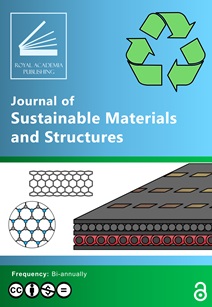About the Journal

Objective
Journal of Sustainable Materials and Structures is intended to contribute to the improvement of the knowledge and implementation of sustainable materials in structural engineering and design. The journal aims at encouraging interdisciplinary research for addressing the emerging global demand for sustainable materials that have lower environmental impact and better resource utilization, as well as better durability and performance of structures in different sectors.
Aims & Scope
Journal of Sustainable Materials and Structures aims to share innovative research work that promotes the advancements in the structures and design engineering of materials and their applications in achieving the sustainable development goals. The journal is intended to encourage the development of new technologies for the synthesis/fabrication of environmentally friendly, long-lasting, and energy-efficient facilities in various sectors such as environmental remediation, construction, transport, energy, and manufacturing. It aims to support interdisciplinary research in the field that would help in improving the efforts towards sustainability on the global level, including materials that are eco-friendly, efficient in the use of resources, and promotes sustainable development. Journal of Sustainable Materials and Structures consists of research articles, review papers, case studies, and technical notes on the topic of sustainable materials and structures. The scope of the journal includes, but is not limited to:
- Novel fabrication techniques for sustainable materials and structures.
- Advanced materials and composites that enable lower-impact production and efficient use.
- Strategies for material substitution to reduce environmental impact in product and structural design.
- Breakthrough materials and systems for efficient carbon capture, storage, and utilization.
- Innovations in material design to support climate-change mitigation technologies.
- Development of materials and technologies for environmental remediation.
- Circular economy approaches for sustainable material use and waste reduction.
- Lifecycle analyses and techno-economic assessments of sustainable technologies and systems.
- Advanced materials and processes from raw material extraction to end-of-life disposal or recycling.
- Exploration of new and emerging materials for sustainable energy generation, storage, and conversion devices.
- Sustainable fuel generation using photo-, electro-, thermo-, and chemo-catalysis.
- Advanced manufacturing processes that reduce energy, water, and materials consumption.
- Development of emerging materials for efficient energy and environmental devices.
- Innovations in sustainable energy technologies for long-term environmental impact reduction.
- Novel technologies for energy-efficient devices and systems aimed at sustainability.
- Theory and simulation of advanced materials for energy and environmental systems.
- Modeling of sustainable materials and their applications in real-world scenarios.
- Design and development of sustainable biomaterials for biomedical applications.
- Sustainable technologies for antimicrobial treatments and healthcare solutions.
- Advanced manufacturing techniques with a reduced environmental footprint, including energy-efficient and water-saving processes.




